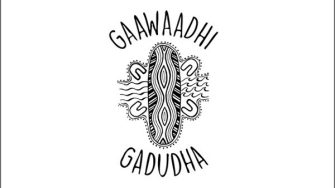
Kinship, Country, Law/Lore, and Dreaming are fundamental concepts for Aboriginal cultures and people. Interpretation and practice may differ between communities and individuals, but these core cultural values play an essential role in nurturing resilience.
Aboriginal cultural resilience is an important but not well understood factor that impacts health outcomes, and is the focus of the new project, Gaawaadhi Gadudha, funded by the Medical Research Future Fund through the National Health Medical Research Council.
The Gaawaadhi Gadudha project, a collaboration between the Gamilaraay, Yuwaalaraay, and Yuin Nations, grassroots organisations, Aboriginal Community Controlled Health Services (ACCHSs), researchers, and policymakers, builds upon existing cultural initiatives and resources; and aims to produce measurable and policy-ready evidence that demonstrates how Aboriginal cultural practice impacts community and individual wellbeing and how it can be better linked with regional health systems to improve health outcomes for Aboriginal peoples. The study is led by a cultural governance group with representation from traditional knowledge holders in the study sites.
The name Gaawaadhi Gadudha represents connection and collaboration between the Yuwaalaraay, and Gamilaraay Nations (freshwater people) and the Yuin Nation (saltwater people) in understanding how their sacred cultural landscapes impact the health and quality of life of their peoples. The name also incorporates shared stories across these landscapes, including the Maangi story of the first pipi brought to Narran Lakes (Dhariwaa) by the seagull, the Guduu Bidi (giant cod) being hunted down the river, and Bubumuur the story of the first platypus. It represents literal/physical, cultural, and spiritual connections across the landscapes of the study.
“First Nations peoples’ health and wellbeing is improved by simply having access to sacred lands and exposure to ceremonies in healing, says Chief Investigator and Senior Cultural Advisor for the project, Ted Fields of Uraah Innovations & Cultural Services.
“Cultural Health can improve an individual's outlook on their overall health, and culture, country and languages can be brought into the clinical care space to support therapy healing. The project will use culture as a starting point to understand health, rather than the other way around,” said Mr Fields.
Instead of testing an intervention that was developed externally to the participating communities, or ‘co-designed’ with non-Aboriginal people, the Gaawaadhi Gadudha project will cultivate culturally governed approaches attuned to Aboriginal ways of being, knowing and doing.
Acknowledging cultural difference is foundational to understanding the cultural determinants of Aboriginal health, says lead Chief Investigator, Dr Aryati Yashadhana from the Centre for Health Equity Training Research & Evaluation at the Centre for Primary Health Care & Equity, which is part of the UNSW School of Population Health.
“Our research team is built on strong connections to, and representation from, Yuwaalaraay, Yuin and Gamilaraay traditional owners and knowledge holders of the North-western and South Coast regions of NSW,” said Dr Yashadhana.
“The project will work through existing culturally governed initiatives operating in these regions, that seek to enhance connection to culture through strengthening connections to sacred sites (physical landscapes of cultural significance), practices (ceremony, medicines, foods), and languages through walaay (cultural camps),” she said. “The walaays will act as study interventions where we will use a range of quantitative and qualitative methods to understand how they are linked to processes of cultural resilience building, and if and how this impacts health and quality of life.”
The project will also collaborate with policy makers and Aboriginal Community Controlled Health Services, to iteratively develop an evidence-informed Model of Cultural Resilience that aims to create linkages between health systems and cultural initiatives through shared goals, communication, and pathways; and to inform how cultural resilience can be enhanced and supported.
Currently the cultural camp work is not linked to regional health systems, which reflects a missed opportunity to create enhanced pathways of holistic and preventive care between ACCHSs, NSW Health services, and community members that centre Aboriginal culture as a key factor in health outcomes.
Dr Yashadhana added, “In Aboriginal health research, it is often the funding that defines the project. I’m proud to say that this research idea truly stemmed from the community, and I’m honoured to join forces with revered traditional knowledge holders from the Yuwaalaraay, Yuin and Gamilaraay Nations to undertake this important research.”
Chief Investigator Ted Fields represents Uraah Innovations & Cultural Services, an Aboriginal advocacy and development body that aims to support cultural resilience and language regeneration by working through governance structures and protocols grounded in Aboriginal cultural law/lore.
Dr Aryati Yashadhana received a $560,209 Medical Research Future Fund Grant to run this project.
Contact Name :
UNSW School of Population Health
